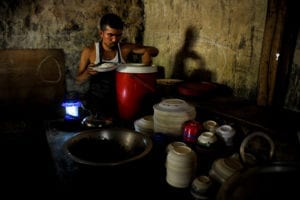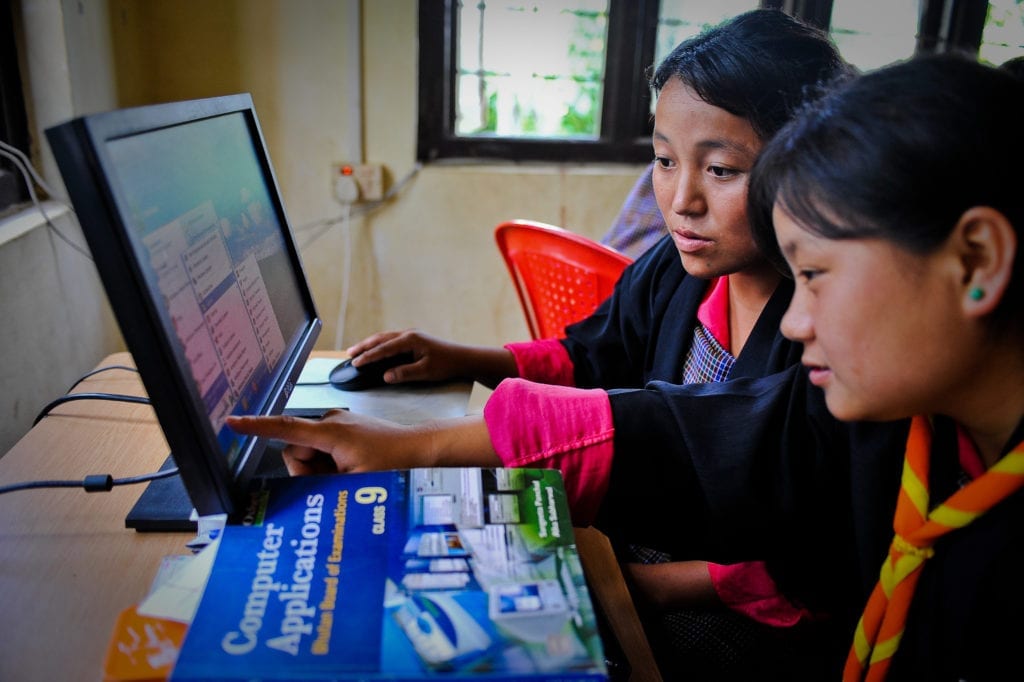For donors who want to support causes in a well-functioning system, Bhutan offers significant opportunities for impact on a national scale.
 By Thinley Choden, Bhutan Country Advisor
By Thinley Choden, Bhutan Country Advisor
Bhutan has a reputation as a “happy” country. This is, in large part, due to our government’s recognition of Gross National Happiness as a vital metric of national wellbeing. However, it’s important to understand that this goal is aspirational. Although it’s nice to get complimented as the last Shangri-La, Bhutan is, at the end of the day, a developing country. To realize our aspirations, we must tackle the issues that face all countries and foster a social sector that supports our progress.

Despite its rosy international reputation, Bhutan remains a developing country. Photo credit: Asian Development Bank
Bhutan faces challenges despite its many strengths. We are a landlocked country, which introduces extra challenges for economic development, logistics, and geopolitics. Demographically, we are a young country. Our population still requires significant skill development for the 21st century. Youth unemployment is very high at about 18%. Furthermore, we are very vulnerable to climate change. Although we have a very intact local environment, with 70% of our country under forest cover, rising temperatures will melt our glacial lakes, impacting our river systems. Our modern lifestyles if not consciously designed and consumed can easily be a climate change threat.
Bhutan’s government is heavily involved in social service delivery…and is quite effective. As a result, Bhutan’s NGO ecosystem is nascent; it started officially in 2008. NGOs must find their role within Bhutan to make themselves more effective and add value rather than duplicate work. Currently, their role is largely in finding a gap and intervening accordingly.

Bhutan’s government is supporting businesses impacted by the lockdown. Photo credit: Antonio Morales García
The current pandemic illustrates this dynamic. When COVID-19 hit the region, Bhutan’s government rapidly mobilized to provide frontline support to its citizens. Measures such as border closure, schools, colleges and institution closures, contact tracing, and social distancing contributed to a low case rate, no death and high recovery rate. However, the pandemic still hit the economy badly. Many businesses and offices shut down or began working from home, unfortunately putting many out of jobs. His Majesty’s office, supported by the government, has been providing salary subsidies and loan interest waivers to support citizens and businesses’ loss of income. In terms of food distribution, the government-owned Food Corporation of Bhutan stocked up on essential food supplies for situations like this.
What does this mean for the NGO sector? The nonprofit sector’s role is mostly limited to indirect activities, such as media awareness of fake news versus real news; mental health; domestic/gender based violence; and youth engagement.
Right now, Bhutan’s NGOs see their role largely as filling in gaps where the government has not been able to reach, but they could do more in advocacy and activism for policy and legislative change or introduction. This is an area where support and investment could help immensely. Because there is no culture of activism in Bhutan, media literacy, the awareness of our democracy, civic engagement, and activism all offer opportunities for progress. There is also a lot of opportunity in education. For example, Bhutan’s core curriculum does not include arts or music education.

Computer skills and media literacy are two key educational opportunities for donors. Photo credit: Asian Development Bank
In Bhutan, people are realizing the importance of tech and being digital—a trend accelerated by COVID-19. There is significant opportunity for NGOs in teaching coding and ICT skills. There are also opportunities for work on LGBTQ issues, HIV and AIDS awareness and healthcare, reducing gender-based and domestic violence, and promoting women’s issues.
For donors who seek to make systemic change on an issue, the value and impact is phenomenal here in Bhutan because of the small scale. When donors commit funds, things actually change. You can see the results within five years, 10 years, 15 years down the road. For those who want to support causes in a well-functioning system that delivers, see positive change, and transform society, Bhutan offers significant opportunities for impact and making a difference on a national scale.
Read more about Bhutan’s climate strengths and challenges in Thinley Choden’s article on WeForum.
Support Give2Asia’s COVID-19 response fund for Bhutan.
Banner photo credit: Terry Feuerborn




